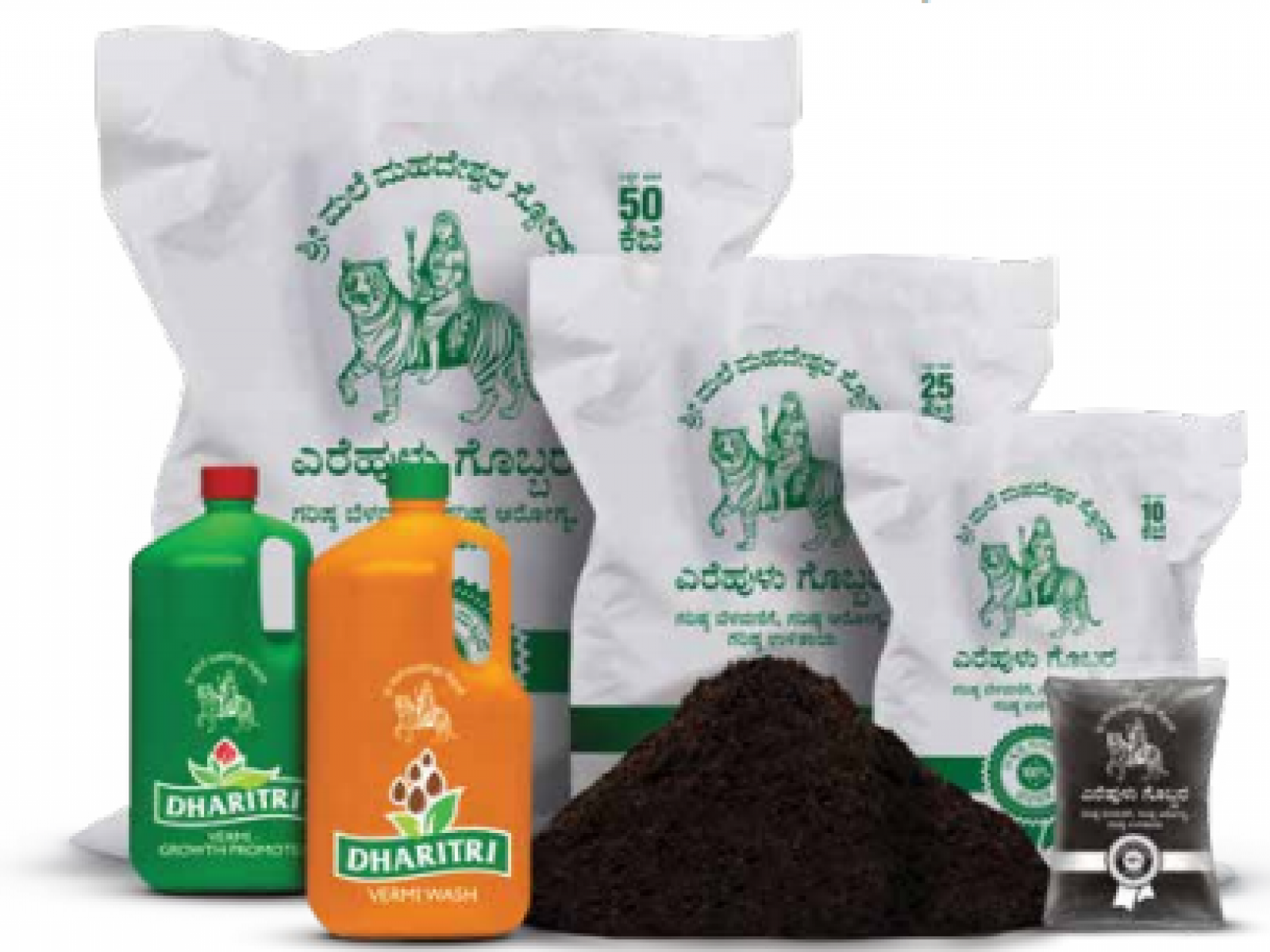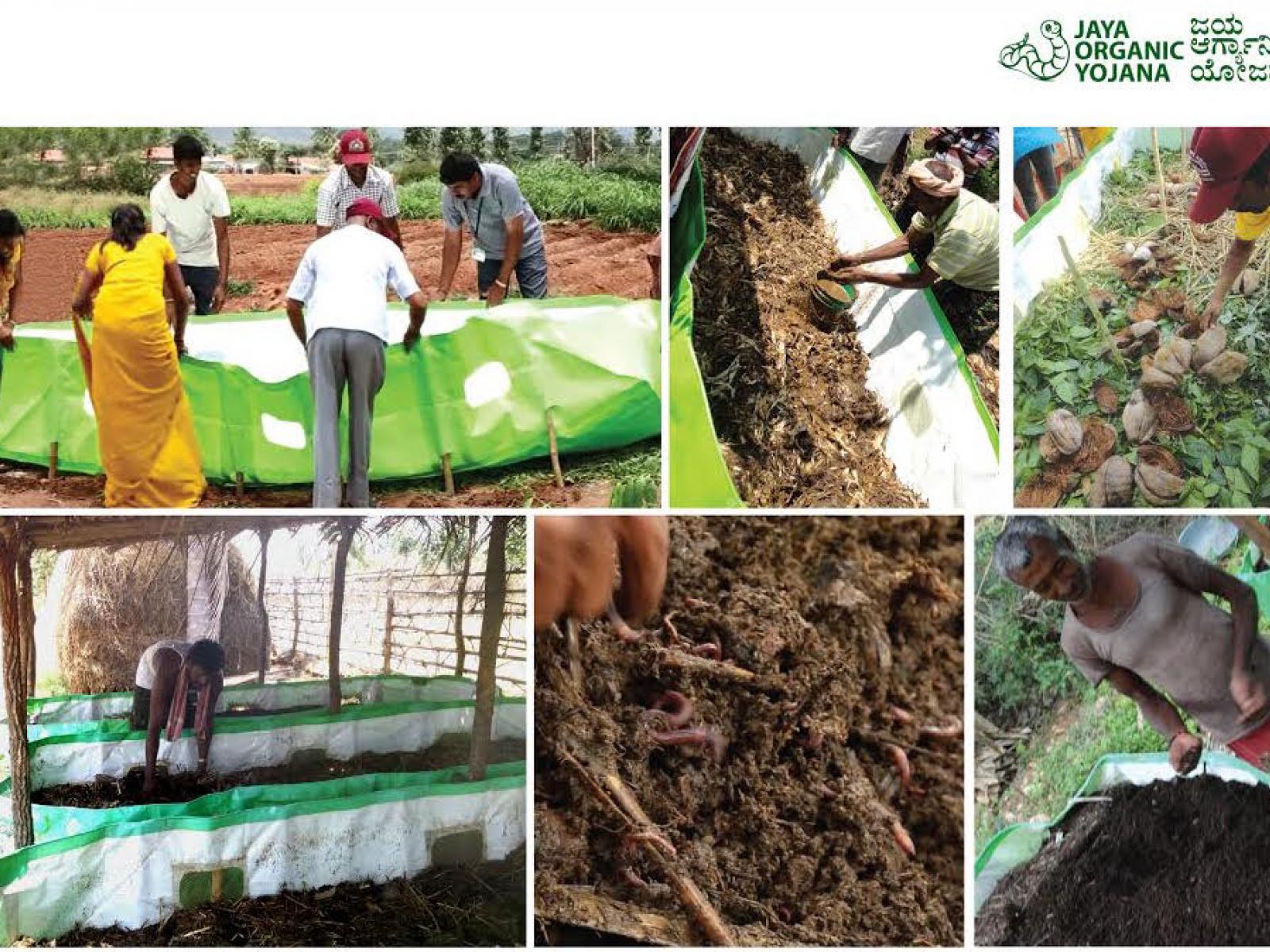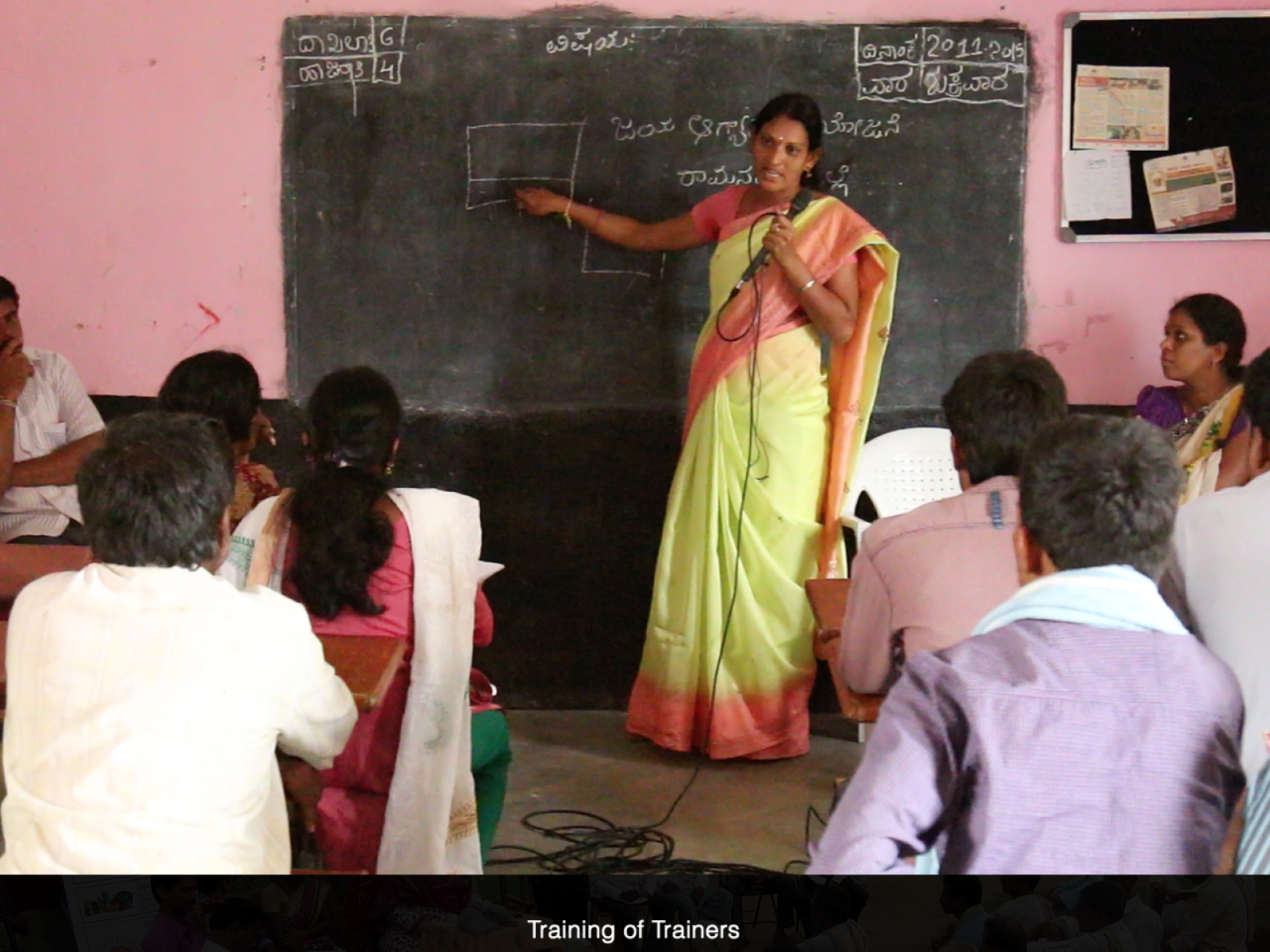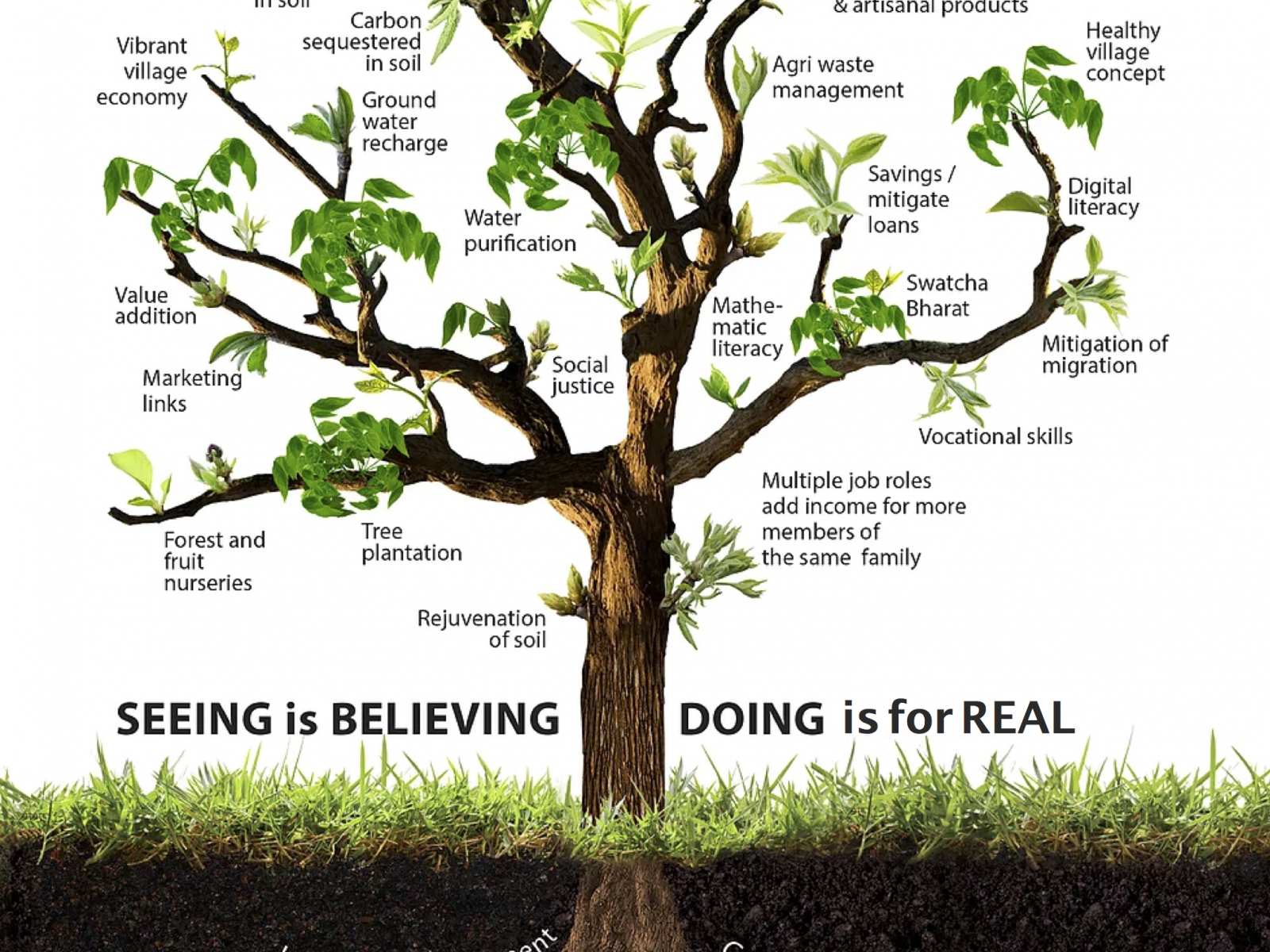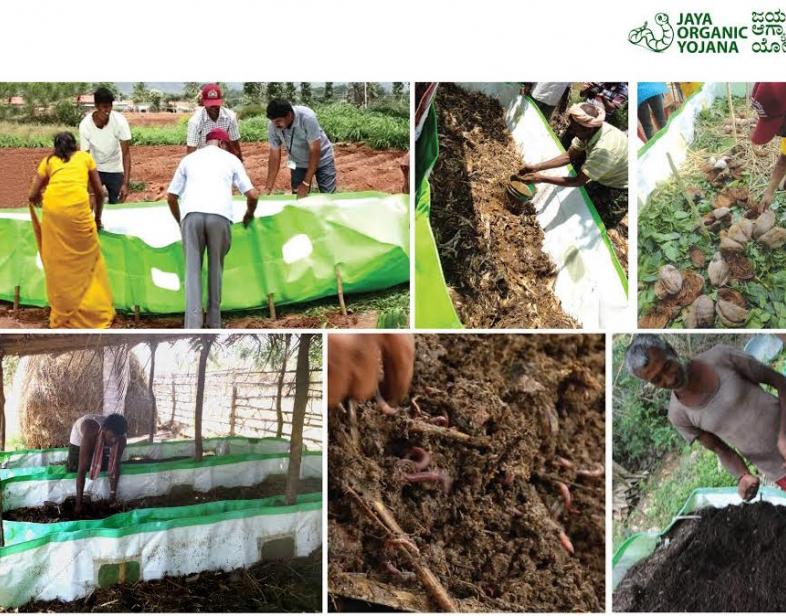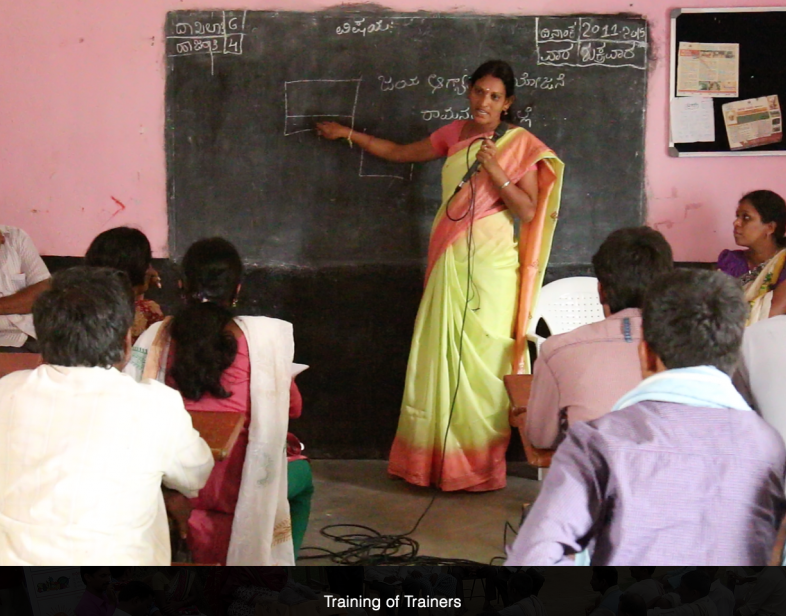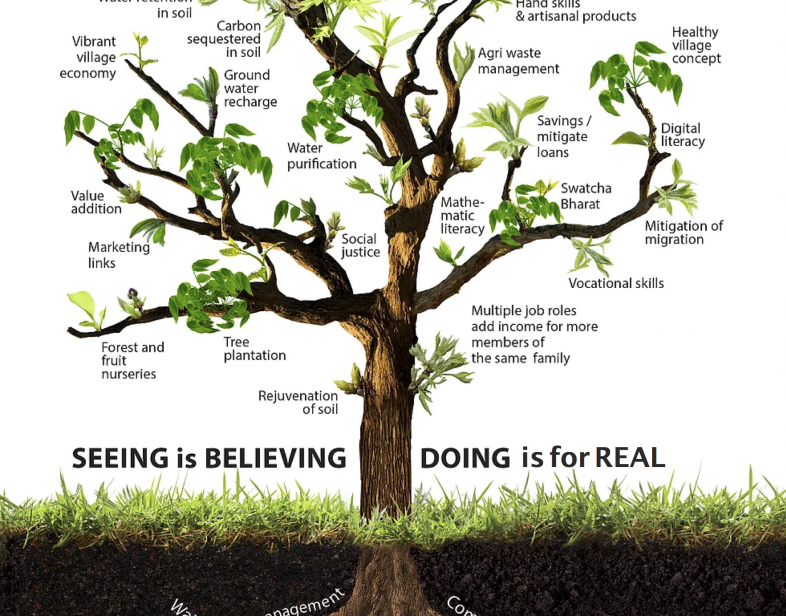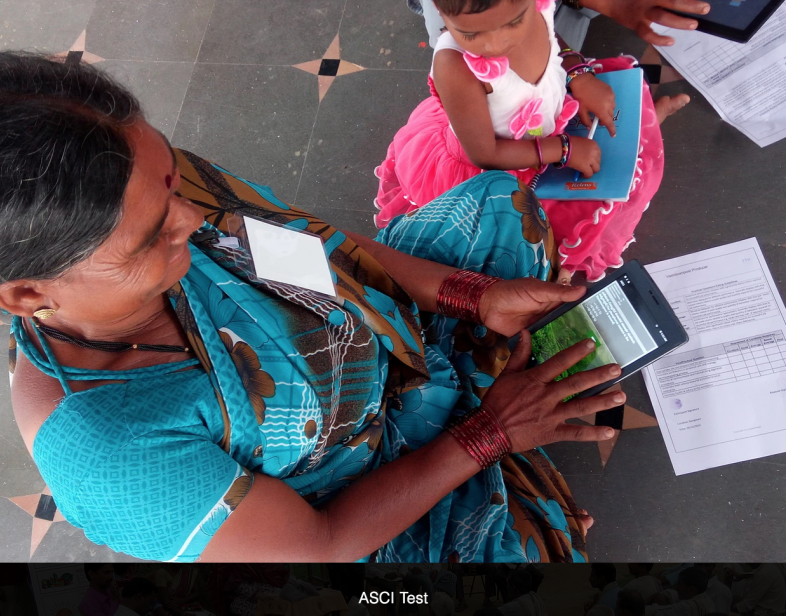An Overview Of Our Solution
In India, environmentally damaging farming practices like crop burning and synthetic fertilizers degrade soil, water and air, leading to accelerated release of greenhouse gases and long-term deterioration of small farmers’ livelihoods. When farmers learn organic composting practices and apply them to degraded land, they revitalize soil while sequestering carbon. Each additional farmer enrolled in our vermicomposting (worm-based composting) program sees an average 60% increase in crop yields, a 100% decrease in chemical fertilizer costs, and average increased annual income of Rs. 80,000 (USD $1,165) from vermicompost sales. This drives a positively reinforcing cycle for green farming practices,a win-win for local food security, livelihoods, topsoil conservation, and climate change mitigation, sequestering over 1,000 metric tons of carbon annually per 300 farmers.
- Population Impacted: 3,860 people
- Continent: Asia
Context Analysis
Across India, where farm output accounts for ~15% of its $2 trillion economy, ~80% of farmers are smallholders managing less than 2 hectares, in households often struggling to maintain dignified living standards. A combination of outdated and environmentally damaging farming practices - such as crop burning and the use of synthetic fertilizers - negatively impacts soil, water and air quality, leading not only to the accelerated release of greenhouse gases but also the long-term deterioration of small farmers’ livelihoods. But when farmers learn organic composting practices and apply it to land that has been depleted from the overuse of chemical fertilizers, they revitalize the soil their livelihoods depend on while sequestering carbon dioxide in the process. India now has an opportunity to incorporate organic food production and waste reduction across vast swaths of its territory thanks to emerging policies and regulations banning crop burning and use of chemical fertilizers.
Describe the technical solution you wanted the target audience to adopt
We want 10,000 Indian farmers over the next 5 years, in addition to 3,860 already trained, to implement ecologically sound farming practices. We promote vermiculture composting, a process tied to agro waste and earthworms that make nutrient-rich fertilizer. Farmers use vermibeds with a 1-ton capacity and the Eudrillus eugeniae earthworm, AKA the African Night Crawler, the most efficient composting earthworm in the tropics. It has high reproduction rates and can quickly digest large quantities of agro waste. In addition to using vermicompost on their land, farmers (men and women) engage in community-level micro-businesses to sell surplus vermicompost, earning additional income. A subset of community leaders will be our “super-audience,” experimenting and learning to improve and innovate vermiculture practice through participatory human-centered research & development, encouraging peers to adopt vermiculture via Farmer Interest Groups (FIGs) and Farmer Producer Organizations (FPOs).
Type of intervention
Describe your behavioral intervention
We aim to end post-harvest crop residue burning and limit chemical fertilizer use in India. Though banned across several Indian states, burning continues to cause air pollution, fires, and massive CO2 release. In the past 30 years, overuse of chemical fertilizers - plus reliance on monocrops and artificial pesticides - has reduced soil fertility by 50% in Southern India. Chemical fertilizers account for up to 80% of human-related nitrous oxide emissions, with no carbon sequestration benefit in soils where applied. To encourage a shift to vermiculture, we use a household-centric community development model - Punaschetana (Revitalize). This involves creating unique state-of-the-art learning materials, tailored curricula, and executing work with sensitive outreach workers. We use a train-the-trainer approach, with trainers, supervisors, and support staff providing capacity-building seminars and equipment to local community stakeholders, who then train local farmers / Farmer Interest Groups (FIGs) to set up their own vermiculture operations. Farmers may purchase equipment outright, qualify for a grant or take out a microloan. After purchasing equipment and participating in a 6-month training program costing approximately Rs 28,000, farmers can typically produce over Rs 80,000 worth of vermicompost/year (a net profit of $770 USD in year one alone). We refer you to a few resources/studies which help guide our work: http://bit.ly/ssjoy1; http://bit.ly/ssjoy2; http://bit.ly/ssjoy3
As needed, please explain the type of intervention in more detail
One of the biggest hurdles for agriculture technology adoption (or any widespread systems change involving tech) is the “conversion period,” when costs of a new approach outweigh its benefits. To overcome this, we use social incentives, with peer-managed workshops, trainings, and site visits designed to demystify vermicomposting and organic agriculture. We also employ emotional appeals, particularly when this new approach to soil management and increased income improves family dynamics (pulling together in a new project helps break out of old patterns). We showcase stories of improved marriages or kin relations to tap into farmers’ sense of moral obligations to their family, showing them a positive path forward rather than shaming them.
Describe your implementation
In India, farmers have become dependant on subsidies. JOY focuses outreach on changing this, promoting pride, self-reliance and productivity for meaningful growth and sustainability. And a vibrant village economy can only be achieved by sustainable enterprise. JOY’s success lies in its community-engagement approach, leveraging a training curriculum - including audio, video and pocket-size lesson booklets - in vernacular language. This ensures high adoption rates and faster social normalization of vermiculture. Beyond a simple “train the trainer” intervention, JOY provides ongoing support to trainers, who in turn offer 1-on-1 in-situ training to farmers and FIGs on their own land. During a 6-month training period, each beneficiary receives a weekly, personal one-hour visit. For farmers interested in selling vermicompost, JOY creates market linkages, along with marketing training and support in an Entrepreneur Development Program (EDP) training program using our unique JOY Starter Kit. The training covers vermicompost harvests at Days 60 and 105. Farmers are certified in vermicompost production, awarded a certificate of EDP in vermiculture, and then the farmer owns the starter kit, increasing earning potential exponentially. This is in addition to the sale of worms & vermiwash, marketable byproducts. Many farmers choose to use their product on their own land to increase crop yields, improve soil quality and save money on obsolete chemical input purchases. In this case, JOY provides training on farming and productivity, while creating market linkages for produce. When funding gaps arise, JOY is unable to keep up supply with the pace of demand from eager farmers. In one case, a partner bank was not equipped to handle the quantity of transactions, and the training program experienced significant banking delays. JOY then focused on remotivating dropouts from three districts and realigning, gaining experience, and fine tuning the program, earning back farmer confidence.
External connections
The main stakeholders are smallholder farmers and the organizations that represent them (Farmer Interest Groups, FIGs, and Farmer Producer Organizations, FPOs). JOY is a partner of the National Skill Development Corporation (NSDC). Its curriculum and lessons have been accredited by the Agriculture Skill Council of India (ASCI), which operates under the Indian Ministry of Skill Development & Entrepreneurship (MSDE). ASCI works towards capacity building by bridging gaps and upgrading skills of farmers, wage workers, and self-employed & extension workers. JOY has been supported by GE India, Bajaj, DAIYA Foundation, Lotus Trust, and Featherlite. Deloitte assessed the impact (glowingly) of our work with GE and NSDC. It partners with Maharaja Institute of Technology (MIT Mysore) and Jindal University for evidence-based research. JOY was awarded the SKOCH Order of Merit Award (Evergreen category). Lastly, JOY partners with Cambridge USA-based Technology Exchange Lab (TEL), an expert in appropriate technology evaluation and implementation with working partnerships with MIT, USAID, and Siemens. TEL works to help international NGOs and communities leverage appropriate technology solutions to maximize the impact of last-mile development around the world. TEL provides technical assistance, fundraising help, and has captured the essence of JOY’s magic in this post: http://innovatedevelopment.org/2015/05/30/joy-from-grassroots-to-organi…
Who adopted the desired behaviors and to what degree?
3,860 farmers have fully shifted to vermiculture-based organic farming and discontinued post-harvest crop residue burning as well as establishing community forest nurseries, livelihoods projects, and engaging in sales of surplus compost. These beneficiaries are in the process of forming about 300 Farmer Interest Groups (FIG) in 2018. Farmers also agree to engage in weekly follow up and monitoring, uploading data with trainers onto a digital tablet. Having validated the sustainability and scalability of the model throughout Karnataka, JOY’s model is now being supported, sponsored, and championed to a much wider audience thanks to engagement by multi-sector actors. Both corporate and government groups have changed their practices and are educating staff on social responsibility and sustainability initiatives. This includes companies such as General Electric and the State Government of Karnataka.
How did you impact natural resource use and greenhouse gas emissions?
Soil and its water retention capacity have been restored and tested by the state of Karnataka’s Horticulture Department and extension agents trained by the Agriculture Skill Council of India. JOY’s 3,860 farmers have sequestered over 18,000 metric tons of carbon. This averages to nearly 5 metric tons of carbon sequestered by each farmer, triple the per capita carbon footprint in India, of 1.6 metric tons. These figures do not take into account reduced carbon emissions from chemical fertilizers, which otherwise would have been used on farmlands. In the next year, as we seek to achieve carbon standard certification, with help from OP Jindal Global University rapid scoping studies to determine sequestration rates for soil and crop types, we also aim to incorporate expanded carbon farming curricula into JOY’s existing training programs. Practices include the introduction of carbon-sink crops, no-till cropping, and the composting of stubble to prevent crop burning.
What were some of the resulting co-benefits?
Soil fertility, water retention and carbon sequestration capacity has been improved. Value added products from the vermiculture process, such as “worm juice”, are now used as natural pesticides and plant boosters for flowering plants and fruits. JOY has documented increased crop yields of up to 60% resulting directly from vermicompost and vermi value-added products. This includes: sunflower seeds (20%), chilis (40%), and cotton (60%). Farmers also save $$, no longer needing to spend approximately $300 USD per acre/year on chemicals. And for farmers interested in selling vermicompost and value added products like vermi wash and the worms themselves, JOY creates market linkages to provide a minimum price of $145 USD per ton of vermicompost. On average, a JOY farmer produces over $1,100 worth of vermicompost annually, with a few documented cases of over $7,000 in annual sales per farmer. Farmers also offer anecdotal evidence of increased well-being and less rural flight among youth.
Sustainability
Farmers see immediate economic benefits switching to vermicompost, particularly if they opt to sell surplus. JOY depends on charity and small program fees. Our results and capacity to scale mean increased charitable and corporate support is highly likely, but we are also working to access carbon markets for earned revenue. Experts in carbon farming have acknowledged JOY’s carbon sequestration benchmarks. We are now considering three carbon standards (1) Climate, Community and Biodiversity (CCB), (2) Verra’s new Sustainable Development Verified Impact Standard (SD VISta), and (3) co-developing a standard with Verra, applicable to the VCS Program sectoral scope 14 for agriculture, forestry and other land use (AFOLU).
Return on investment
It cost ~USD $50,000 USD of JOY’s funds per year x 5 years to achieve 3,860 farmers (965 households) practicing vermiculture-based organic farming (~ USD $250,000). Also, each household has paid a one-time USD $160 fee to participate in a six-month training program (significant matching funds ~ USD 154,000). The payoff: for villagers an average income boost of USD $92/month (some earn $583/month) from selling compost and surplus worms to farmers; for farmers at all scales, a sustainable alternative to costly chemical fertilizers; for the region, reasonably priced organic produce, a fertile landscape with restored soil, and safer water supply; and for the world, increased carbon storage.
How could we successfully replicate this solution elsewhere?
While vermiculture has been practiced for millennia, efforts over the past decades to drive large-scale adoption in developing regions have largely failed. JOY’s model has proven to be scalable. Its goal is to expand and scale up across 3 new states, with a target of 3,000 newly enrolled farmers in 2018, en route to a 5-year goal (by 2022) of 10,000 total farmers enrolled and practicing vermiculture-based organic farming. Total cost is expected to be $750K. It relies on corporate and research partner engagement in establishing a Farmer Innovation Lab. Lab participants will be master adopters / risk takers. To reach scale and have capacity for experimentation, a sustainable finance stream is vital. JOY is turning to carbon markets and needs help with monitoring protocols for data on carbon sequestration at its sites. JOY will weigh (1) VCS certification or (2) less technically rigorous ratings to sell credits on evolving voluntary exchanges / private markets.
